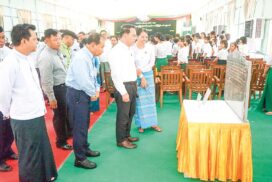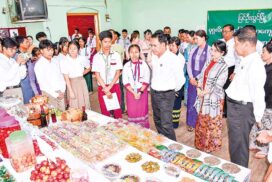The ongoing literacy campaign, taking place nationwide from 6 April to 15 May 2024, is a testament to Myanmar’s rich history of promoting education. Led by university and college students, as well as aspiring teachers, this 40-day mass literacy campaign aims to eradicate illiteracy across the country.
Myanmar’s commitment to literacy has deep roots. Over 60 years ago, local authorities, supported by dedicated volunteer youths, launched the “3-Rs course” — reading, writing, and arithmetic — in Myanmar, and UNESCO recognized it for its significant impact. This legacy of literacy promotion was further honoured when Myanmar received the Mohammad Reza Pahlavi Prize 8 September 1971, and the Noma Prize in 1983, acknowledging its outstanding efforts in mass literacy campaigns.
Through the mass literacy campaign, Myanmar hopes to change the socioeconomic trajectory of its citizens. By emphasizing the value of literacy, individuals can unlock new opportunities for personal and professional growth. With improved literacy, people can make more informed decisions and approach life with greater confidence, thereby creating a brighter future for themselves and their communities.
The journey towards widespread literacy began modestly in 1964 when four trainees from the Kanbe teacher training school initiated a one-month literacy course in East Sanpya Village, Meiktila Township, Mandalay Region. This marked the beginning of a historic literacy movement in Myanmar. To address this issue, Meiktila District was selected as a pilot district for a literacy campaign in 1969, resulting in a significant increase in literacy rates among its population.
By building on this success, the 2024 literacy campaign aims to replicate these achievements across all regions and states. By transforming illiterates into literate individuals, the campaign seeks to broaden their opportunities for livelihoods and daily functioning. Those literates will have a great chance to shape their lives brighter and prosper as much as they can.
According to the 2019 interim population data, there were approximately 4.1 million illiterate individuals aged 15 and above nationwide, with a higher proportion of women than men. The 2019 population data also revealed that 8.1 per cent of the 46.463 million people above the age of five had never attended school. Additionally, more than 900,000 individuals out of the 25.169 million people above 25 years old, accounting for 3.8 per cent, had no formal education. This lack of access to learning opportunities has hindered their ability to engage fully in society and earn a livelihood.
Through the mass literacy campaign, Myanmar hopes to change the socioeconomic trajectory of its citizens. By emphasizing the value of literacy, individuals can unlock new opportunities for personal and professional growth. With improved literacy, people can make more informed decisions and approach life with greater confidence, thereby creating a brighter future for themselves and their communities.













